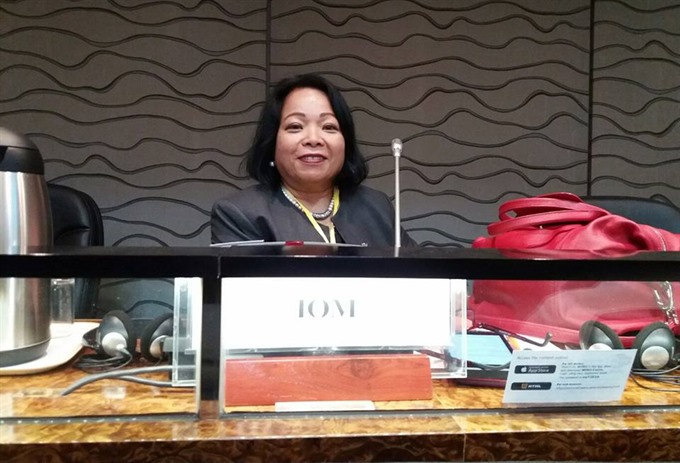.jfif) Opinion
Opinion

Director of the International Organisation for Migration’s Regional Officer for Asia and the Pacific, Dr Nenette Motus, shares his view on the situation of migration.
 |
| Nenette Motus |
Dr Nenette Motus
We are almost at the end of the year, according to the Western business calendar. For many, it’s the start of a journey home to see family, to be with friends. The journey ends in reunions, togetherness, sharing. Even if we travel alone, we travel hopefully, knowing there will be a warm welcome at the end of the tiring journey. It’s the time of the year when strangers help one another, when we smile and exchange greetings with people we don’t know.
Our journeys may be short, but they are long enough for us to reflect on the millions who have set out this year on less happy journeys. Asia may be one of the more peaceful continents on our planet, but is one with some of the biggest disparities between rich and poor. Millions are on the move, seeking work and comfort for their families.
December 18 is International Migrants Day, celebrated under the United Nations theme of togetherness. Our welcome for migrants, our togetherness and solidarity with them must extend further than simply benefiting from their contributions. We must also accept them into our society and assure them of the rights that we take for granted.
The Asia and the Pacific region hosts the largest migrant population in the world. According to UN data, between 2000 and 2015, Asia added more international migrants than any other area of the world - 26 million in total, or 1.7 million additional migrants per annum.
Asia’s prosperity and growth is built on a culture of migration, on the life stories and contributions of migrants. Asia can lead the world in celebrating this narrative, in realising that extending a welcoming hand to migrants brings economic and social benefits.
The migration journey will not always be smooth, but host societies will never benefit if they neglect the welfare of migrants. Nothing increases the stigma that migrants face like diseases, ghettoisation and poverty. Conversely, nothing increases the value and contribution of migrants than ensuring good healthcare (including mental health) for them, housing, nutrition and working conditions.
Very often, we send our young, talented, and educated people not only within our region but also to other regions. We expect their right to health and access to education to be ensured, as it should be under the UN Convention on the Protection of the Rights of All Migrant Workers and Members of their Families. We need to demand that these rights be protected for all migrants, not just the ones to which we are connected. If we don’t care for the migrants in our midst, how can we demand the same for our children overseas?
The migrants’ contribution is interwoven into our daily lives. Our shopping is bagged by migrants. Our meals at restaurants are served by migrants. We wear clothes made by migrants. Our office buildings are often built by migrant workers. The elderly in our aging societies are supported by migrants. Migrants are among the best and brightest of their communities, and quickly rise to become doctors, lawyers, community leaders, tech innovators.
Why do we stigmatise a group from which we benefit so much? Migrants are too often perceived as "they.". They are the ones who take jobs from us or increase the crime rate or bring disease to our workplace and communities. This prejudice cannot be reconciled with the valuable role migrants play in our daily lives.
Migrants sacrifice the one thing that we cherish above all other – their homes. We need to recognise this, and ensure we value their contributions while appreciating what they have given up to be with us. Migration is a journey, not an escape. It’s a quest for sanctuary, work, a second chance, a new dawn. We can walk that path together.
*Dr Motus is Director of the International Organisation for Migration’s Regional Officer for Asia and the Pacific, located in Bangkok, Thailand




